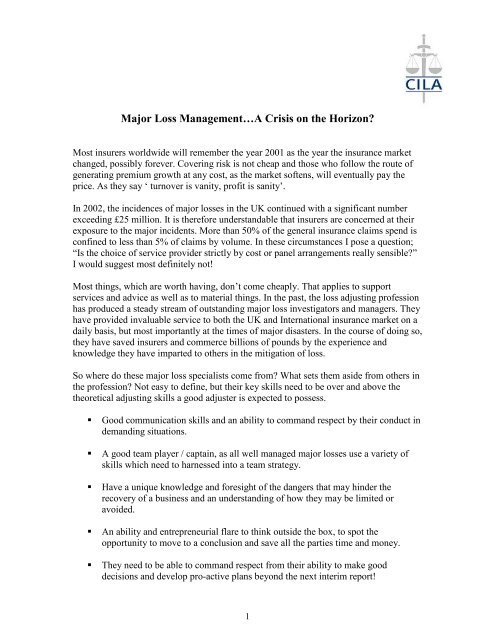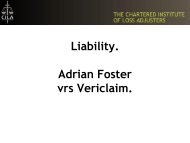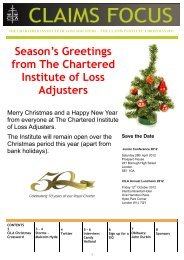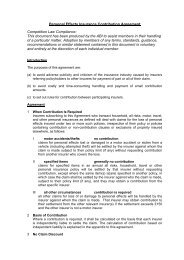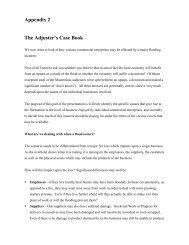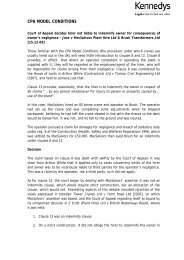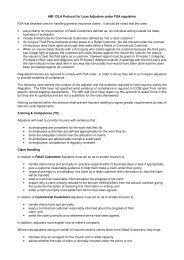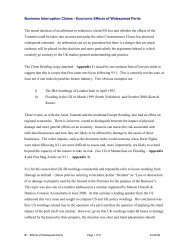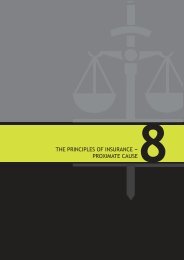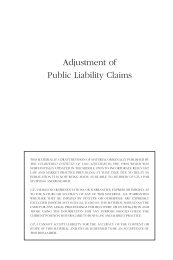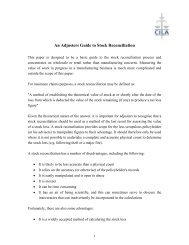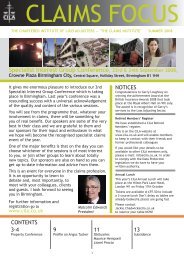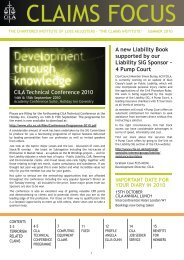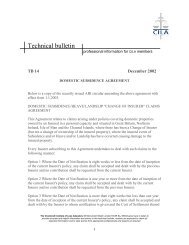tom heward - major l.. - CILA/The Chartered Institute of Loss Adjusters
tom heward - major l.. - CILA/The Chartered Institute of Loss Adjusters
tom heward - major l.. - CILA/The Chartered Institute of Loss Adjusters
You also want an ePaper? Increase the reach of your titles
YUMPU automatically turns print PDFs into web optimized ePapers that Google loves.
Major <strong>Loss</strong> Management…A Crisis on the Horizon<br />
Most insurers worldwide will remember the year 2001 as the year the insurance market<br />
changed, possibly forever. Covering risk is not cheap and those who follow the route <strong>of</strong><br />
generating premium growth at any cost, as the market s<strong>of</strong>tens, will eventually pay the<br />
price. As they say ‘ turnover is vanity, pr<strong>of</strong>it is sanity’.<br />
In 2002, the incidences <strong>of</strong> <strong>major</strong> losses in the UK continued with a significant number<br />
exceeding £25 million. It is therefore understandable that insurers are concerned at their<br />
exposure to the <strong>major</strong> incidents. More than 50% <strong>of</strong> the general insurance claims spend is<br />
confined to less than 5% <strong>of</strong> claims by volume. In these circumstances I pose a question;<br />
“Is the choice <strong>of</strong> service provider strictly by cost or panel arrangements really sensible”<br />
I would suggest most definitely not!<br />
Most things, which are worth having, don’t come cheaply. That applies to support<br />
services and advice as well as to material things. In the past, the loss adjusting pr<strong>of</strong>ession<br />
has produced a steady stream <strong>of</strong> outstanding <strong>major</strong> loss investigators and managers. <strong>The</strong>y<br />
have provided invaluable service to both the UK and International insurance market on a<br />
daily basis, but most importantly at the times <strong>of</strong> <strong>major</strong> disasters. In the course <strong>of</strong> doing so,<br />
they have saved insurers and commerce billions <strong>of</strong> pounds by the experience and<br />
knowledge they have imparted to others in the mitigation <strong>of</strong> loss.<br />
So where do these <strong>major</strong> loss specialists come from What sets them aside from others in<br />
the pr<strong>of</strong>ession Not easy to define, but their key skills need to be over and above the<br />
theoretical adjusting skills a good adjuster is expected to possess.<br />
<br />
<br />
<br />
<br />
<br />
Good communication skills and an ability to command respect by their conduct in<br />
demanding situations.<br />
A good team player / captain, as all well managed <strong>major</strong> losses use a variety <strong>of</strong><br />
skills which need to harnessed into a team strategy.<br />
Have a unique knowledge and foresight <strong>of</strong> the dangers that may hinder the<br />
recovery <strong>of</strong> a business and an understanding <strong>of</strong> how they may be limited or<br />
avoided.<br />
An ability and entrepreneurial flare to think outside the box, to spot the<br />
opportunity to move to a conclusion and save all the parties time and money.<br />
<strong>The</strong>y need to be able to command respect from their ability to make good<br />
decisions and develop pro-active plans beyond the next interim report!<br />
1
Be an effective negotiator and judge <strong>of</strong> people and situations.<br />
Finally, but certainly not exhaustively, <strong>major</strong> loss players do have to be good motivators,<br />
not only <strong>of</strong> their team, but also <strong>of</strong> some policyholders who have been known to suffer<br />
severe depression following a loss.<br />
<strong>The</strong>re are adjusters who possess some <strong>of</strong> the above skills and many others. However,<br />
there are relatively few who possess a sufficient number <strong>of</strong> them to make an effective<br />
<strong>major</strong> loss player.<br />
<strong>The</strong> various pr<strong>of</strong>essional qualifications adjusters possess, in addition to the <strong>Chartered</strong><br />
<strong>Institute</strong> <strong>of</strong> <strong>Loss</strong> <strong>Adjusters</strong> diploma, clearly add to the breadth <strong>of</strong> their knowledge.<br />
Gaining the opportunity <strong>of</strong> putting that knowledge into effective use and acquiring those<br />
difficult to define skills, which can only be acquired in the ‘University <strong>of</strong> Life’, can take a<br />
long time.<br />
Within the insurance industry, we are in danger <strong>of</strong> seriously under-valuing those who are<br />
responsible for the management <strong>of</strong> <strong>major</strong> losses. <strong>The</strong> financial difference between going<br />
through the motions <strong>of</strong> handling a £10 million property and BI loss and actually proactively<br />
managing the same loss from day one is a very significant number. It could be<br />
15% or £1,500,000! However, we continue to self-select the managers <strong>of</strong> such losses by a<br />
volume panel arrangement and, in addition, we invariably pay them a scale fee, rather<br />
than for the expertise and time they expend on the loss.<br />
Like many things in life, we don’t appreciate the value <strong>of</strong> something until we loose it. I<br />
believe we are in danger <strong>of</strong> loosing or, at the very least, seriously diluting the <strong>major</strong> loss<br />
management skills the insurance industry has come to rely on in the past. <strong>The</strong> morale in<br />
many adjusting firms, and some <strong>of</strong> the claims departments <strong>of</strong> insurers, has never been so<br />
low. People management and motivation has given way to an unsightly intellectual<br />
eradication process in the misguided belief that cutting your expense ratios to the bone<br />
makes you more pr<strong>of</strong>itable. Of course, attention to expense ratios is important, but, if as a<br />
result <strong>of</strong> their reduction, there is an increase in the claims ratio, the net effect is less<br />
pr<strong>of</strong>it. Unfortunately, one is easy to measure and the case for paying more for quality<br />
advice on claims is considered subjective. By careful audit on <strong>major</strong> loss claims, I believe<br />
it is possible to measure the value <strong>of</strong> quality resources and, in so doing, develop best<br />
practise for managing this significant claims expenditure.<br />
If the insurance industry is to retain those skills both within claims departments and loss<br />
adjusting, which we have in the past taken for granted, we need to take a serious look at<br />
succession management. Adjusting skills on commercial claims are developed over many<br />
years from the regular exposure to differing claims situations. Today’s <strong>major</strong> loss<br />
2
adjusters came into the pr<strong>of</strong>ession when the insurance industry was more stable and when<br />
many <strong>of</strong> the adjusting companies were owned and managed by adjusters. Today that is<br />
not the case and the owners <strong>of</strong> adjusting businesses will be unable, if the current trend<br />
continues, to cut fees on commercial adjusting business to uneconomic levels, to pay<br />
salaries to attract the brightest recruits into adjusting. <strong>The</strong> process is likely to be<br />
accelerated by the inevitable reduction in the volume <strong>of</strong> commercial losses going to<br />
adjusting firms as the trend for larger deductibles removes from the insurance arena a<br />
large raft <strong>of</strong> commercial losses. It makes no sense to cut claims administration and<br />
adjusting costs by £20 million, but, as a direct result, increase the cost <strong>of</strong> claims leakage<br />
by £200 million.<br />
Can a crisis be avoided To avoid a crisis you first have to recognise that one is looming<br />
or has arrived. Insurance like many financial market sectors is under pressure and it will<br />
need the very best resources to improve the situation. <strong>The</strong>re needs to be a change <strong>of</strong><br />
attitude within commercial insurance to the purchase and selection <strong>of</strong> out-source<br />
providers. Good claims managers can measure the difference in service providers when it<br />
comes to mitigation <strong>of</strong> loss and leakage. <strong>The</strong> procedures for selecting <strong>major</strong> loss<br />
resources needs to become more flexible to allow informed claims managers to do the job<br />
they are paid for and select the best resources. A team need not come from one source,<br />
but may be assembled under a team leader from a number <strong>of</strong> firms. With some <strong>of</strong> the<br />
<strong>major</strong> loss resources now working for smaller adjusting firms and accountancy<br />
organisations, it makes good sense to allow claims managers to employ the best resources<br />
whoever they may be employed by at the time. <strong>The</strong> basis for charging for <strong>major</strong> loss<br />
handling should also be reviewed. In this way, a far better system <strong>of</strong> resource matching in<br />
the area <strong>of</strong> <strong>major</strong> claims would evolve.<br />
Adjusting firms also have a part to play in the training <strong>of</strong> their most skilful staff and in<br />
ensuring that their <strong>major</strong> loss players are allowed the time to do the tasks for which they<br />
have been selected and not overburdened with volume claims. After all, we would not<br />
expect a heart surgeon to also run a GP’s surgery! This revaluation and appreciation <strong>of</strong><br />
the high level adjusting skills would once again continue to attract quality people and<br />
allow them to take on some <strong>of</strong> the most challenging situations the insurance industry has<br />
to face.<br />
Is this problem mirrored in Underwriting I‘ll leave that question to others!<br />
Tom Heward<br />
Director<br />
Grant Thornton's Insurance Claims Solutions<br />
Article from Claims Pr<strong>of</strong>essional Magazine – April 2003<br />
3


